Join Our Newsletter To Be Informed When New Videos Are Posted
Join the thousands of fellow Studends who rely on our videos to learn how to read the bible in Hebrew for free!
Hebrew Text
וַיֹּאמֶר לָהּ מַלְאַךְ יְהוָה הַרְבָּה אַרְבֶּה אֶת־זַרְעֵךְ וְלֹא יִסָּפֵר מֵרֹב׃
English Translation
And the angel of the Lord said to her, I will multiply thy seed exceedingly, that it shall not be numbered for multitude.
Transliteration
Vayomer lah malach Adonai harbah arbeh et-zareich ve-lo yisafer merov.
Hebrew Leining Text
וַיֹּ֤אמֶר לָהּ֙ מַלְאַ֣ךְ יְהֹוָ֔ה הַרְבָּ֥ה אַרְבֶּ֖ה אֶת־זַרְעֵ֑ךְ וְלֹ֥א יִסָּפֵ֖ר מֵרֹֽב׃
וַיֹּ֤אמֶר לָהּ֙ מַלְאַ֣ךְ יְהֹוָ֔ה הַרְבָּ֥ה אַרְבֶּ֖ה אֶת־זַרְעֵ֑ךְ וְלֹ֥א יִסָּפֵ֖ר מֵרֹֽב׃
🎵 Listen to leining
Parasha Commentary
📚 Talmud Citations
This verse is quoted in the Talmud.
📖 Berakhot 29b
The verse is referenced in a discussion about the blessings of fertility and the fulfillment of divine promises.
📖 Megillah 14a
The verse is cited in the context of discussing the prophecy and the role of angels in delivering divine messages.


Context of the Verse
This verse (Bereshit 16:10) appears in the narrative of Hagar, Sarah's maidservant, after she flees from Sarah's presence. The angel of Hashem finds her in the wilderness and delivers this promise regarding her descendants. The language echoes earlier divine promises to Avraham (Bereshit 13:16, 15:5), suggesting a connection between the destinies of Yitzchak's lineage and Yishmael's lineage.
Rashi's Commentary
Rashi explains that the phrase "הַרְבָּה אַרְבֶּה" ("I will multiply exceedingly") uses a doubled verb form to emphasize the magnitude of the blessing. He notes that this mirrors the language used in the blessing to Avraham (Bereshit 22:17), indicating that Yishmael's descendants would also become numerous, though distinct from the chosen line of Yitzchak.
Rambam's Perspective
In Moreh Nevuchim (Guide for the Perplexed 2:42), Rambam discusses angelic communication as a form of divine prophecy. Here, the angel speaks as a divine messenger, conveying Hashem's promise. The assurance of innumerable offspring aligns with the broader theme in Sefer Bereshit of divine providence shaping the destiny of nations.
Midrashic Interpretation
Bereishit Rabbah (45:9) comments on the phrase "וְלֹא יִסָּפֵר מֵרֹב" ("that it shall not be numbered for multitude"). The Midrash contrasts this with the promise to Avraham that his descendants would be as numerous as the stars - while both are innumerable, Yisrael's blessing is celestial (stars = spiritual elevation), while Yishmael's is terrestrial (sand = physical multitude).
Halachic Implications
Linguistic Analysis
Ibn Ezra observes that the verb "אַרְבֶּה" appears in the imperfect tense, suggesting an ongoing, progressive multiplication rather than a one-time event. This aligns with the historical reality of Arab nations descending from Yishmael proliferating across generations.